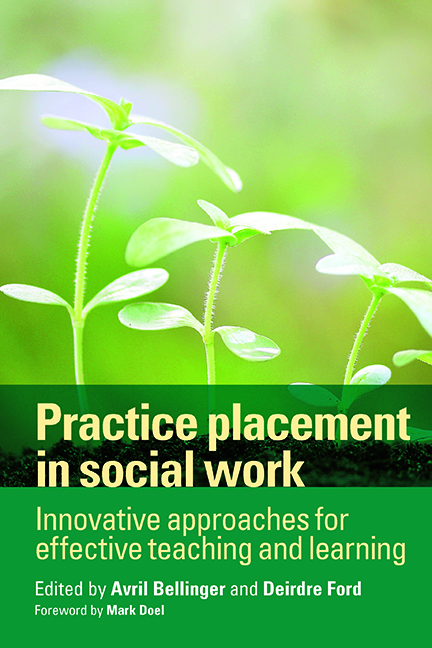Book contents
- Frontmatter
- Dedication
- Contents
- Foreword
- Notes on contributors
- Introduction
- One Student-led services
- Two International placements: learning from a distance
- Three The outside looking in – an independent social worker’s experience of practice educator work
- Four ‘Do you have to be white to pass this course?’ Developing support for black and minority ethnic students in a predominantly white area
- Five Men in social work education: building a gendered alliance
- Six Hidden in plain sight: use of an arts-based method for critical reflection
- Seven Getting our hands dirty: reconnecting social work education as if the earth matters
- Eight Social media for students in practice
- Nine Developing placement capacity in the third sector
- Ten Observations of student practice: what difference does observer qualification make?
- Eleven Filling the gap: constructive responses to the erosion of training standards for practice educators
- Twelve The concept of integrity in relation to failing and marginal students
- Thirteen Cultivating discretion: social work education in practice and the academy
- Index
Thirteen - Cultivating discretion: social work education in practice and the academy
Published online by Cambridge University Press: 01 September 2022
- Frontmatter
- Dedication
- Contents
- Foreword
- Notes on contributors
- Introduction
- One Student-led services
- Two International placements: learning from a distance
- Three The outside looking in – an independent social worker’s experience of practice educator work
- Four ‘Do you have to be white to pass this course?’ Developing support for black and minority ethnic students in a predominantly white area
- Five Men in social work education: building a gendered alliance
- Six Hidden in plain sight: use of an arts-based method for critical reflection
- Seven Getting our hands dirty: reconnecting social work education as if the earth matters
- Eight Social media for students in practice
- Nine Developing placement capacity in the third sector
- Ten Observations of student practice: what difference does observer qualification make?
- Eleven Filling the gap: constructive responses to the erosion of training standards for practice educators
- Twelve The concept of integrity in relation to failing and marginal students
- Thirteen Cultivating discretion: social work education in practice and the academy
- Index
Summary
Introduction
Traditionally, in the realm of social work education, practice learning or fieldwork education was consigned to the status of the poor relation (Davis and Walker, 1987; Domakin, 2014). In many UK university departments, the post designated for the organisation of, and support for, practice learning was temporary, part-time and generally assigned to a female staff member (Langan and Day, 1992). Social workers who made the transition to academic posts were socialised into developing research profiles, privileging certain forms of knowledge, following conventional processes and adopting traditional priorities in the academy. Although pedagogic research, particularly relating to practice education, would be a logical route for their career progression, it is perceived to have an inferior status within research valuation (Canning and Gallagher-Brett, 2010).
The ambivalence of higher education towards practice learning, and, indeed, towards it as a form of community engagement, is epitomised by the actions of older universities, who have relinquished virtually any vocational subject involving practice placements. In the UK, teacher training, adult education, nursing, health professions and social work have been consigned in the main to what are termed ‘post-1992’ universities, previously polytechnics. ‘Russell Group’ universities have systematically disinvested in vocational courses – the London School of Economics, Reading, Oxford, Exeter – culminating in the closure of the master's programme at Southampton in 2012. This ambivalence is not a new phenomenon; there were struggles to maintain the survival of the ‘Certificate in Social Training’ and of adult education in Oxford during the 1920s. Barnett House, for example, was established in 1914 and became a department of Oxford University. Initially, it trained Oxford social policy graduates to work alongside ‘the poor’ through the settlement movement (Halsey, 1976). Barnett House has only survived today, however, by relinquishing qualifying social work training in 2004 and focusing exclusively on social policy research (Smith et al, 2014).
In a capitalist society, where divisions and categorisations are the norm, practice education and classroom learning are inevitably distinguished by status. This is despite the testimonies of countless generations of students who have valued placements as the most important aspect of their education (Lam et al, 2007; Domakin, 2014).
- Type
- Chapter
- Information
- Practice Placement in Social WorkInnovative Approaches for Effective Teaching and Learning, pp. 203 - 214Publisher: Bristol University PressPrint publication year: 2016

